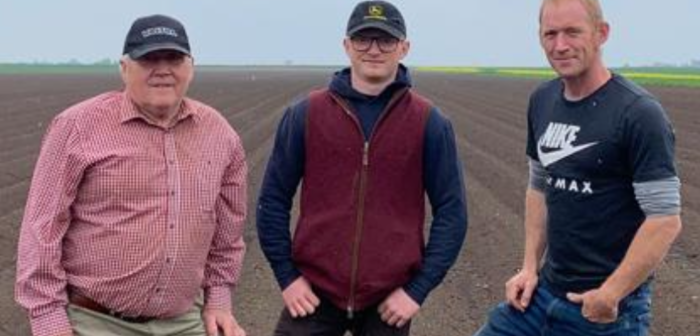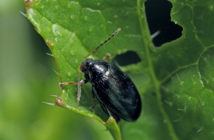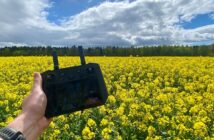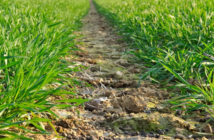A Lincolnshire farmer believes many in the industry are ignoring valuable research into how best to protect crops from extreme weather conditions and are losing millions of pounds as a result.
As well as growing potatoes, sugar beat cereals and peas at Rose Villa Farm in Spalding, Lincolnshire, Marcus Palmer is the sole UK distributor of Algifol, a seaweed-based biostimulant.
Marcus says recent unexpected frosts, combined with almost no rainfall in April, will have had a drastic effect on many growers, who rely solely on chemical fertilisers.
Mr Palmer says that despite academic studies being produced since 2009, UK farmers are sadly ignorant of the natural properties of biostimulants such as Algifol.
One such academic papers – De Saeger, J., Van Praet, S., Vereecke, D. et al. Toward the molecular understanding of the action mechanism of Ascophyllum nodosum extracts on plants. J ApplPhycol 32, 573–597 (2020) – written in 2019, said that the use of brown seaweed enhances play tolerance against environmental stresses such as drought, salinity and frost.
While the studies have not shown how or why the biostimulant improves the plant’s ability to cope with extreme weather, they have clearly demonstrated that the Ascophyllum nodosum extracts in Algifol and its lipophilic fraction significantly increased tolerance to freezing temperatures in vitro and in vivo assays.
Seaweed extracts have been used for many years and in several areas, including medicine and agriculture. Still, despite calls for the use of inorganic fertilisers to be reduced, the need to maintain or increase yields has maintained the popularity of traditional methods.
One Cambridgeshire farmer has witnessed the benefits of applying Algifol to a field of frost-damaged early potatoes and still uses Algifol to this day to improve the quality of his produce
Greg Gowler, who farms 450 acres in Cambridgeshire with his son Adam. In May 2017, Greg saw his early potatoes had turned black following a sharp frost. However, just one day after applying Algifol, at the rate of one litre per hectare, the leaves recovered quickly and went onto produce a good crop for him.
“We had a real hard frost, and it hit my early potatoes badly,” says Mr Gowler. “I was in a bit of a panic but having used Algifol before, I knew how good it was so I gave Marcus a ring. He arranged an express delivery.
“I was amazed at how the crop recovered. The leaves went from black to normal in a matter of days, and with continued applications through the season, I got a very pleasing yield. I still use Algifol to this day.”
Manufactured in Germany by NeoMed-Pharma, Algifol contains significant levels of trace elements, vitamins, enzymes, amino acids, carbohydrates, polyuronides and growth-regulating plant hormones.
As well as having a yield-enhancing effect, NeoMed-Pharma says its biostimulant also helps lower the crop’s carbon footprint by improving fertiliser uptake through better rooting and improved photosynthesis, thus reducing leaching and losses to the atmosphere.
“Lincolnshire, in particular, has been hit by hard frosts recently, and I’ve heard from lots of people that their crops have been affected,” says Mr Palmer. “When you combine these frosts with a lack of rainfall, it’s quite a challenge to achieve good crop establishment. I think there could be millions of pounds worth of damaged crops in fields around Yorkshire and Lincolnshire at the moment, which could be revived by using a biostimulant such as Algifol. There is increasing awareness of biostimulants, and lots of the big fertiliser and chemical companies are introducing their own brands. Algifol has been established for a long time and is proven around the world. Our customers, once they’ve tried it, rarely go back. It really is that effective.”
Algifol can be used on all crop types, with MJP Supplies recommending a one litre per hectare rate of application via a trailed or mounted sprayer. The product can be applied alongside most crop protection products.
“The algae used to produe Algifol grows on rugged, rocky shores, where it is whipped by waves and at low tides endures dryness, sun and frost. The seaweed grows 30 times faster than land plants and has, over millions of years, adapted to the incredible stress of their location,” adds Mr Palmer. “The best part for farmers is that Algifol passes this stress tolerance onto plants!”
To find out more about Algifol or to purchase a trial pack, visit www.mjpsupplies.co.uk; email marcus@mjpsupplies or call 07702 293 727




